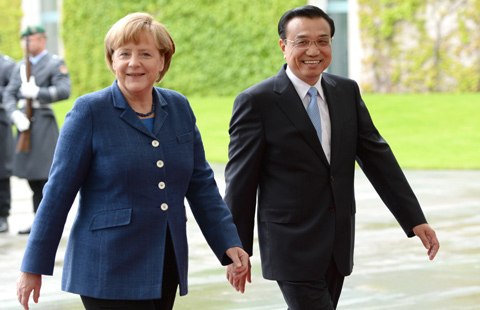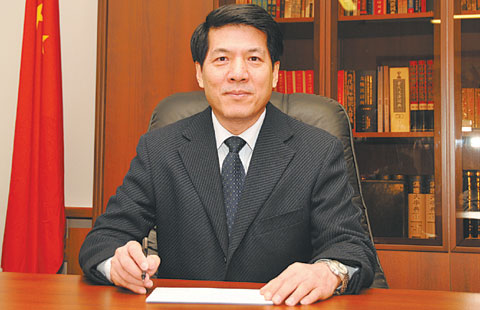
Remarks by H.E. Li Keqiang Premier of the State Council of the People's Republic of China At the First Plenary Session of the Tenth ASEM Summit
Comments Print Mail Large Medium SmallMilan, 16 October 2014
Mr. President, Dear Colleagues,
It is my pleasure to attend the Tenth ASEM Summit in Milan, a fashion capital, in the invigorating autumn. October in China is the season of harvest and joy, so I hope the summit will yield fruitful results. I believe the two new partners, Croatia and Kazakhstan, will add fresh vitality to ASEM. On behalf of the Chinese government, I wish to thank the European Union and the Italian government for their thoughtful arrangements.
Asia and Europe, being two different continents, are linked together by mountains and rivers, and belong to the same geographic plate. Eurasia is the world's largest and most populous landmass. Back 2,000 years ago, the ancient Silk Road linked Asia with Europe and connected the civilizations of the East with the West. The Renaissance and the Enlightenment movement in Europe benefited from the ancient oriental wisdom, and the modernization of Asia was a process of learning from Western science, technology and industrial revolution. With the West learning from the East, and the East learning from the West, Asia and Europe have exchanged with and complemented each other, promoting development of the human society. In the 21st century, Europe has continued to lead the world in economy, science and technology, and Asia is now a region where the emerging economies are most dynamic. Asia and Europe have worked together to overcome the international financial crisis, which further strengthened their relationship of win-win cooperation and inclusive development.
Eurasia, home to more countries than other landmasses on earth, has stayed at the heart of international politics since ancient times. Its people used to suffer enormously from the scourge of war. Nonetheless, with no large-scale wars on Eurasia for about 70 years since the end of WWII, stability has become the pursuit of the people, and expanding trade has helped promote common development. Having said that, regional conflicts and turmoils in today's world are still affecting the stability of Eurasia. We therefore need to learn from historical experience, make full use of our sense and wisdom, and remain committed to the path of peace, security, stability and development.
Eurasia is a land that boasts the greatest development opportunities and potential in the world. Since its inception 18 years ago, ASEM has witnessed deepening political dialogue, robust practical cooperation and extensive social and cultural exchanges. With expanding converging interests, ASEM members have grown into a community of shared responsibilities and destinies. The theme of this meeting, Responsible Partnership for Sustainable Growth and Security, is highly relevant. China stands ready to work with other ASEM partners in an open, inclusive and united spirit to foster the awareness of community, advocate unity and coordination, and actively build a new type of comprehensive partnership for peace and development between Asia and Europe. Along this line, I wish to make the following proposals:
—We need to jointly uphold peace, security, stability and development in Asia and Europe. Spanning across the Northern hemisphere, Eurasia covers an area of over 40 million square kilometers. Peace on this land has a direct bearing on the future and destiny of the 4.4 billion people living here and its implication goes even beyond to affect the world as a whole. More than ever before, we need a peaceful and secure Eurasia, a land free from confrontation and war. The 51 ASEM partners take four permanent seats in the UN Security Council, and have instituted many regional political and security dialogue and cooperation mechanisms. Together, we represent an effective force upholding world peace and stability. ASEM members need to be more united, continue to participate in and support a multi-polar world and international and multilateral cooperation, and work to improve various mechanisms of dialogue and cooperation. We also need to commit ourselves to enhancing mutual trust and resolving crisis, and to addressing conflicts and disputes through political and peaceful means. Together, we may work to promote the building of a new pattern of international relations featuring peaceful coexistence and win-win cooperation.
— We need to jointly promote connectivity and trade and investment liberalization in Asia and Europe. Though Asian and European countries are on the same landmass, their trade has been hampered by many geographical obstacles. Connectivity leads to prosperity, and that's what Eurasia urgently needs. China has initiated the Silk Road economic belt and the 21st century maritime Silk Road, and is ready to work with countries in the region to build a network of infrastructure connectivity on Eurasia, so as to deepen regional cooperation and promote common development. China will host a dialogue on Asia-Europe connectivity in 2015, and will launch a number of cooperation projects in this regard in due time. Meanwhile, we should recognize that trade between Asia and Europe only accounts for ten percent of their total trade, which points to a huge potential to be tapped. To expand economic cooperation and trade between Asia and Europe, we need not only the hardware basis of connectivity, but also the software support of institutional arrangements. We need to hold high the banner of trade and investment liberalization and facilitation and work together to uphold a fair and non-discriminatory multilateral trading regime. We need to build an open and inclusive regional free trade arrangement, resolutely oppose all forms of protectionism, and speed up the development of an integrated Asia-Europe market. China proposes that a senior officials' meeting on trade and investment be held in 2015, on the basis of which the ASEM Economic Ministers' Meeting could hopefully be resumed as soon as possible. To promote Asia-Europe cooperation under the new situation, we need to enhance exchange and cooperation on innovation, promote green, low-carbon and smart growth, and create new highlights in the economic growth of the two regions. China proposes that an ASEM cooperation center on science, technology and innovation be established, which may grow into a major platform for innovation and development.
— We need to jointly promote Asia-Europe cultural exchange and social development. The key to sound relations between states lies in amity between their peoples, and amity between peoples heralds successful cooperation. Cultural interactions, especially people-to-people exchanges, serve as a strong boost to Asia-Europe cooperation and must therefore be nurtured and cultivated. The inter-culture and inter-faith dialogue mechanisms have been in function for ten years. The Asia-Europe Foundation has launched over 600 exchange projects in the areas of education, culture and social development involving more than 17,000 people, and these projects have been well received by the people of Asia and Europe. Going forward, ASEM partners should continue to promote cooperation in people-to-people and social exchanges, support multi-channel and multi-tiered exchanges between parliaments, social organizations, think tanks, universities and the media, and strengthen experience sharing and project cooperation on urbanization, public health, population aging and environmental protection. China proposes to incorporate cooperation on people with disabilities into the Asia-Europe cooperation framework, so that more special groups and the wider public could benefit directly from our cooperation.
Dear Colleagues,
As a member of the international community and a country of Eurasia, China has worked actively to promote world peace and development. China will stay firmly committed to the path of peaceful development, as this is an important national development strategy made by China. The Chinese people fully appreciate the value of peace. Without a peaceful and stable international environment, the huge achievements of China's economic development would not have been possible. The Chinese nation loves peace. China, a country that has made some achievements in development, is a peaceful force that will always be on the side of justice. China has actively participated in the international system and earnestly observed international law. We support the core role of the United Nations and its Security Council in international affairs and support the leading role of the WTO and other relevant international organizations in the global governance mechanism. China maintains that all countries need to observe the purposes and principles of the UN Charter, treat each other with respect and equality, and refrain from doing things to others that they do not want others to do on themselves.
Many Asian and European countries are China's close neighbors. China will follow the long-term policy of good-neighborliness and friendship, and will continue to treat its neighbors with all sincerity, truefulness and friendship. As we often say, distant relatives are not as good as neighbors and neighbors are as close as brothers. China will continue to carry out mutually beneficial cooperation with its neighbors, enhance the development of regional integration, handle relevant differences in a rational and pragmatic manner and endeavor to promote long-term stability and common prosperity in the region. China stands ready to share the benefits of economic development and shoulder the responsibilities for security and stability with its Asian neighbors so as to make the path of peace and cooperation in Asia even wider.
China is committed to developing an open global economy. China's door of opening-up will always be open, and only wider still, so that opening-up and development will be mutually reinforcing. The more open China is, the more it values its friendship and cooperative relations with other countries; the more developed China grows, the greater contribution it will make to world peace and prosperity.
The Ebola virus disease has recently become a major threat to global public health and security, and the international community is offering more help to the government and people of epidemic-hit countries. The Chinese government has so far provided three rounds of mostly-needed assistance to the epidemic region, and has sent nearly 200 experts and medical personnel to the region for epidemic prevention and control. Here, I wish to announce on behalf of the Chinese government that a new round of at least 100 million RMB yuan of assistance will be provided to the epidemic region in West Africa. That will include 60 ambulances, 100 motorcycles, 10,000 protective care units, and 150,000 sets of personal protective equipments. China will once more send several dozen experts to the epidemic region, and China plans to train 10,000 medical personnel and community-level prevention staff for the epidemic region. China is ready to work with other Asian and European countries that are offering help, and will stand alongside the governments and people of the epidemic-hit region to rise up to the challenge together.
Dear Colleagues,
As the largest inter-governmental forum across continents, ASEM has become an indispensable bridge and platform linking Asia and Europe. Enhanced dialogue and cooperation between ASEM members will not only benefit our own development, but also contribute to world peace, development and cooperation. Just as the ancient Chinese thinker Xun Zi (Hsun Tsu) remarked, "When earth piles up into mountains, wind and rain will originate thereof." The Italian navigator Christopher Columbus also observed, "As long as we hold the land of hope close to our heart, we can surely brave the storm." Let the Milan summit be our new starting point from which solid steps will be made and hands joined for a better future of Asia-Europe exchange and cooperation.
Thank you.
Related Stories
Strategic opportunities in Li's visit 2014-10-17 07:10
Premier Li attends 10th Asia-Europe Meeting 2014-10-17 05:56
Li hopes China and Vietnam will implement consensus 2014-10-17 05:54
Premier Li attends the Fifth Italy-China Innovation Forum 2014-10-16 19:29
Highlights of Premier Li’s Europe visit 2014-10-16 08:02
'Main course' still ahead, Li says 2014-10-16 08:02
Li sows the seeds for farming 2014-10-16 08:01
Background






